 Remember Andrea Yates? She is the mother who, in 2001, drowned her five children in a bathtub. She said that the devil had influenced her children, and so they needed to die.
Remember Andrea Yates? She is the mother who, in 2001, drowned her five children in a bathtub. She said that the devil had influenced her children, and so they needed to die.
A few years later, another mother, Deanna Laney, tried to kill her two children, claiming that God told her to.
Then there is the case of Victoria Soliz, who tried to drown her son in a puddle because Jesus told her to do so.
No Christian with their head on straight (or unless you’re John Piper) honestly believes that God actually told these mothers to kill their children. Nobody who really understands the message and ministry of Jesus, and especially His love for children, can imagine that Jesus wanted or commanded these mothers to do such horrific things to their babies.
And yet…
How strange is it that while we decry and condemn such actions by various people today, we turn around and tell the story of God drowning millions of babies (along with their mothers and fathers and siblings) in the flood story of Genesis 6-8?
Does this make any sense?
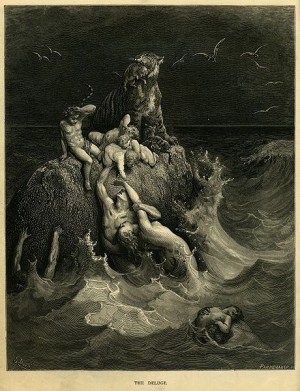 On the one hand, we say, “There is no way God told these mothers to drown their babies,” but then we turn around and say, “God drowned millions of babies during the flood.”
On the one hand, we say, “There is no way God told these mothers to drown their babies,” but then we turn around and say, “God drowned millions of babies during the flood.”
Oh, but they deserved it, you see. Those babies at the time of the flood were going to grow up to be the devil. After all, haven’t you read what Genesis 6 says about the Sons of God having sex with the daughters of men? All those millions of babies were devil spawn! God had to drown them.
Yeeeaaah … that’s what the mothers above said too. Go read those articles I linked to. You’ll see. They thought their children had been influenced by Satan and so Jesus wanted them dead. Sounds eerily similar to our “explanation” for the flood, doesn’t it?
If we really stop to think about it, if there is absolutely no way that Jesus would be involved in a mother drowning her baby today, then there is absolutely no way that Jesus would be involved in the drowning of millions of babies in the flood.
“What are you saying, Jeremy?”
I am just saying that the flood event, as recorded in Scripture, looks nothing like Jesus. Does anybody disagree with that? You cannot find anything anywhere in the Gospels where Jesus acts or behaves in this sort of way toward anyone—and especially not toward children.
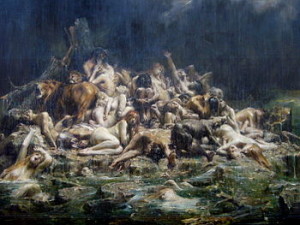 I have talked about this with numerous people over the past couple years, and almost without fail, people who defend the divine origin of the flood point to Jesus entering the temple with a whip (John 2:15; Matt 21:12) as proof that Jesus was also involved in sending the flood.
I have talked about this with numerous people over the past couple years, and almost without fail, people who defend the divine origin of the flood point to Jesus entering the temple with a whip (John 2:15; Matt 21:12) as proof that Jesus was also involved in sending the flood.
Really? Overturning the tables of a few greedy moneychangers is the same thing as drowning millions of babies? I just don’t see it. The text doesn’t even say anything about Jesus using this whip on the moneychangers—or even on the animals! Oh, except for all the children. These Jesus whipped till they were bloody. NO! NO! NO!
In my conversations about this, people usually then turn to the book of Revelation and point out how when Jesus returns a second time, He is going to kill so many people that there will be a lake of blood 200 miles wide and as deep as a horse’s bridle (Rev 14:20).
Yeah… I’m thinking that if this is how we read the book of Revelation, we’ve probably misunderstood the book.
 If Jesus is a God who drowns babies because “They’re the devil!” and then rides His horse through a lake of blood from His slain enemies because “They wouldn’t worship me!” (Duh! You drowned millions of their babies!), I’m just not sure this sort of God is worthy of our worship.
If Jesus is a God who drowns babies because “They’re the devil!” and then rides His horse through a lake of blood from His slain enemies because “They wouldn’t worship me!” (Duh! You drowned millions of their babies!), I’m just not sure this sort of God is worthy of our worship.
But I still follow and worship the God revealed in Jesus.
Why?
Because Jesus doesn’t drown babies. He doesn’t slaughter His foes and then ride horses through their blood. And He never, ever, ever tells us to do so either. And since Jesus reveals God to us, this means that God doesn’t do these things either.
So what about the flood? What about Revelation?
I’m working on it!
I can’t yet share what I think about these texts, but one thing I know for sure: We will never understand these troubling texts of Scripture, and we will never understand God, and we will never understand ourselves, unless and until we begin with the realization that Jesus does not drown babies.


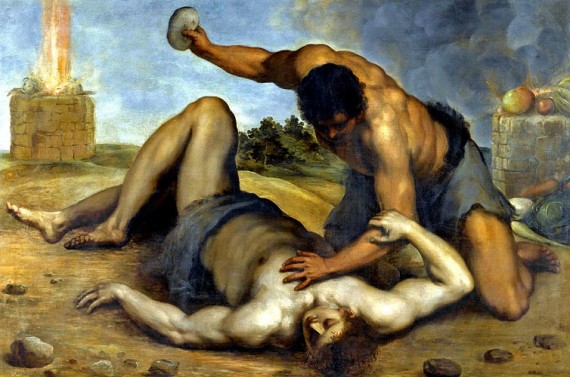
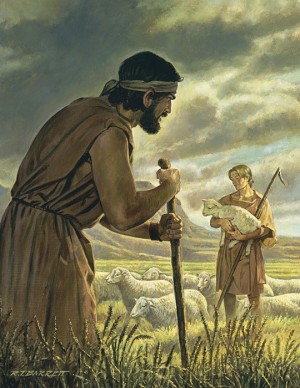 God gently rebukes Cain and tells him he is already accepted and loved, that nothing is required. All God wants is for Cain to live well, to do what is right. If he doesn’t do what is right, rather than being the savior of his family, Cain will fall into the same trap that his parents had fallen into, and will become prey to sin. In fact, God warns Cain that sin is already crouching at Cain’s door, seeking to devour him.
God gently rebukes Cain and tells him he is already accepted and loved, that nothing is required. All God wants is for Cain to live well, to do what is right. If he doesn’t do what is right, rather than being the savior of his family, Cain will fall into the same trap that his parents had fallen into, and will become prey to sin. In fact, God warns Cain that sin is already crouching at Cain’s door, seeking to devour him. 
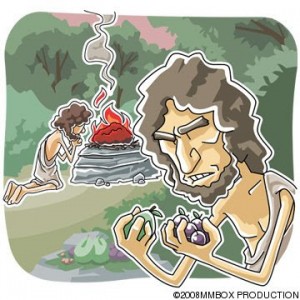 Though some believe the
Though some believe the 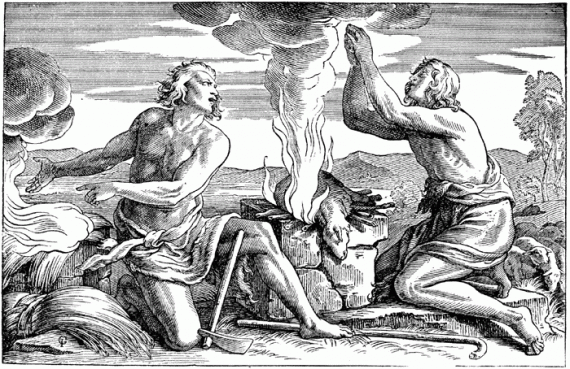
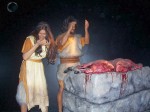
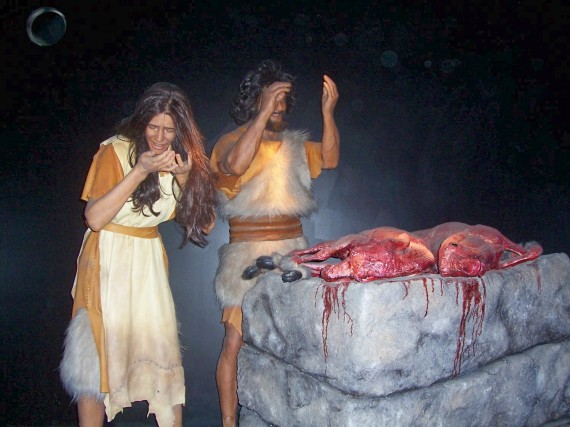
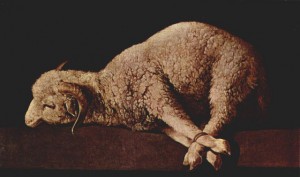 Frankly, this seems to be an awful lot to read into one single verse which says nothing other than that “God made tunics of skin, and clothed them.”
Frankly, this seems to be an awful lot to read into one single verse which says nothing other than that “God made tunics of skin, and clothed them.” It is interesting to note, however, that one of the more common Jewish explanations of this text is that the skin which Adam and Eve were clothed with was snake skin. The Jewish Targum Pseudo-Jonathan says that the Lord made garments for Adam and Eve from the skin which the serpent in the garden had cast off. This seems pretty far-fetched if you have ever seen the papery skin shed by serpents.
It is interesting to note, however, that one of the more common Jewish explanations of this text is that the skin which Adam and Eve were clothed with was snake skin. The Jewish Targum Pseudo-Jonathan says that the Lord made garments for Adam and Eve from the skin which the serpent in the garden had cast off. This seems pretty far-fetched if you have ever seen the papery skin shed by serpents.
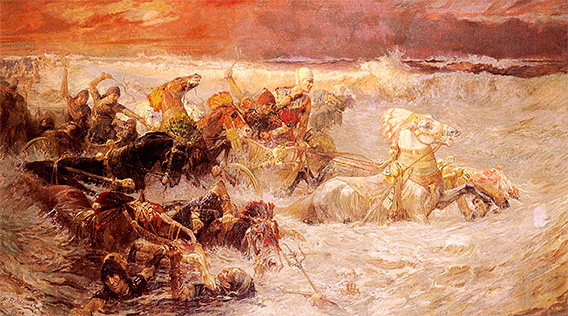
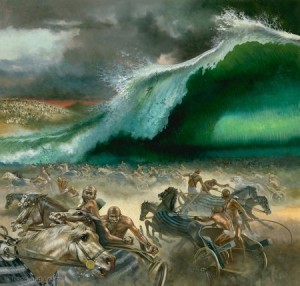 In Exodus 14:24-25, after the Egyptian army had followed the Israelites into the Red Sea, the text says that God sought to turn the Egyptian army back by bringing trouble upon them. He caused the chariot wheels to fall off, and brought confusion among the ranks.
In Exodus 14:24-25, after the Egyptian army had followed the Israelites into the Red Sea, the text says that God sought to turn the Egyptian army back by bringing trouble upon them. He caused the chariot wheels to fall off, and brought confusion among the ranks. How can a God who says "Love your enemies" (Matthew 5:44) be the same God who instructs His people in the Old Testament to kill their enemies?
How can a God who says "Love your enemies" (Matthew 5:44) be the same God who instructs His people in the Old Testament to kill their enemies?
